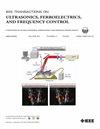超声神经调制过程中头骨内声波传播的时空分布。
IF 3
2区 工程技术
Q1 ACOUSTICS
IEEE transactions on ultrasonics, ferroelectrics, and frequency control
Pub Date : 2024-04-01
DOI:10.1109/TUFFC.2024.3383027
引用次数: 0
摘要
听觉系统参与超声神经调制的证据和假设引起了广泛的兴趣和关注。针对这一问题,我们在小鼠头骨中进行了声学剪切波模拟,并在失聪小鼠中进行了行为实验。模拟结果表明,沿头骨传播的剪切波在听皮层中没有达到足够的声压来调节神经元。随后进行了行为实验,用超声波唤醒麻醉小鼠的运动皮层或腹侧被盖区。实验结果表明,即使是聋哑小鼠,目标区域的超声波刺激也能显著提高唤醒评分,而失去超声波凝胶则取消了这一效果。免疫荧光染色也表明,超声波可以调节目标区域的神经元,而听觉皮层的神经元则需要正常听觉系统的参与才能激活。总之,沿头骨传播的剪切波无法到达听皮层并诱导神经元激活。超声神经调制诱导的唤醒行为需要在没有听觉系统参与的情况下直接作用于功能相关的刺激目标。本文章由计算机程序翻译,如有差异,请以英文原文为准。
Spatiotemporal Distributions of Acoustic Propagation in Skull During Ultrasound Neuromodulation
There is widespread interest and concern about the evidence and hypothesis that the auditory system is involved in ultrasound neuromodulation. We have addressed this problem by performing acoustic shear wave simulations in mouse skull and behavioral experiments in deaf mice. The simulation results showed that shear waves propagating along the skull did not reach sufficient acoustic pressure in the auditory cortex to modulate neurons. Behavioral experiments were subsequently performed to awaken anesthetized mice with ultrasound targeting the motor cortex or ventral tegmental area (VTA). The experimental results showed that ultrasound stimulation (US) of the target areas significantly increased arousal scores even in deaf mice, whereas the loss of ultrasound gel abolished the effect. Immunofluorescence staining also showed that ultrasound can modulate neurons in the target area, whereas neurons in the auditory cortex required the involvement of the normal auditory system for activation. In summary, the shear waves propagating along the skull cannot reach the auditory cortex and induce neuronal activation. Ultrasound neuromodulation-induced arousal behavior needs direct action on functionally relevant stimulation targets in the absence of auditory system participation.
求助全文
通过发布文献求助,成功后即可免费获取论文全文。
去求助
来源期刊
CiteScore
7.70
自引率
16.70%
发文量
583
审稿时长
4.5 months
期刊介绍:
IEEE Transactions on Ultrasonics, Ferroelectrics and Frequency Control includes the theory, technology, materials, and applications relating to: (1) the generation, transmission, and detection of ultrasonic waves and related phenomena; (2) medical ultrasound, including hyperthermia, bioeffects, tissue characterization and imaging; (3) ferroelectric, piezoelectric, and piezomagnetic materials, including crystals, polycrystalline solids, films, polymers, and composites; (4) frequency control, timing and time distribution, including crystal oscillators and other means of classical frequency control, and atomic, molecular and laser frequency control standards. Areas of interest range from fundamental studies to the design and/or applications of devices and systems.

 求助内容:
求助内容: 应助结果提醒方式:
应助结果提醒方式:


